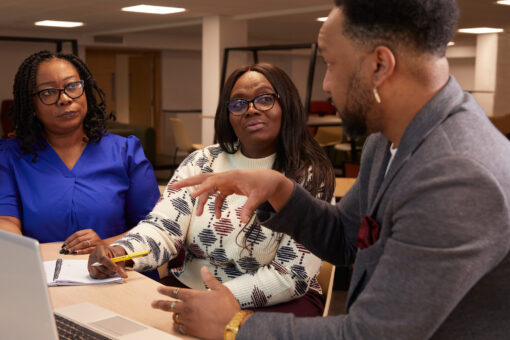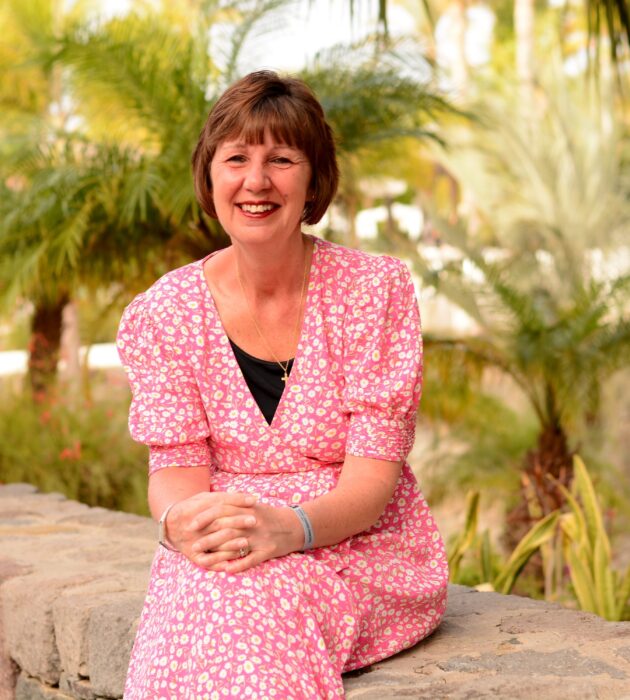Challenges for the social work profession, according to practice leaders

We love bringing social work leaders together on our programmes. We know that social work leaders find it hugely beneficial to explore knotty problems and share expertise with their peers. We also learn so much in the process.
At the final residential of Pathways 4, our leadership training for practice leaders, the participants spoke to Isabelle Trowler, chief social worker for children and families in England. They shared some of their valuable insights into the challenges in children’s social work – from the need to strengthen multi-agency partnerships to confronting systemic racism – and how to address them.

Daniel Toth, Head of Service, Luton
Strengthening multi-agency partnerships
Multi-agency partnerships in social work are essential for supporting children and families. These partnerships typically include social services, healthcare, educational institutions, the police or community organisations. Each of these agencies brings their own expertise and resources to address the complex needs of children and families.
However, these professionals are also facing significant pressures such as lack of funding, long waiting lists for their services and recruitment difficulties. To address these challenges and improve multi-agency partnerships, senior leadership teams must engage with partners to understand local needs and challenges. This involves raising questions within peer groups and creating spaces for sharing challenges and solutions at local and national levels.
Once we understand what different agencies need, we can work together more effectively, ensuring better support for children and families.

Jackie McCarthy, Head of Service, Sutton
Confronting systemic racism together
My reflections are on the pressing need to confront systemic racism within institutional systems. For example, there is a disproportionate number of Black children living in care currently in London and statistics also show that Black families are more likely to experience financial challenges and have less access to health services.
As practice leaders, we need to be curious, acknowledge these challenges and openly discuss them. Using an anti-racist lens to understand the circumstances behind a family’s reluctancy to engage and being committed to adapting our practices to meet their specific needs will help us focus on what is best for each child. It’s essential to ask difficult questions: whose needs are we meeting, the organisations or the child’s?
By looking at our strategies through an anti-racist lens and redefining our processes to respect and understand perspectives and backgrounds, we can actively challenge and dismantle systemic racism in social work practice, ensuring inclusivity and fairness.

Teresa Hills, Director of Operations, Luton
Embracing diverse perspectives
As an oversees Social Worker from India, I appreciate the benefit of community-based interventions, often led by trusted community champions having lasting positive impact on those we serve. This is different to some of the Eurocentric approaches that currently dominates social work practice. Community around a child approach allows room for more creativity within the way that social workers interact and support children and families, while embracing diverse perspectives and approaches from the very people who know the lived experiences of our children and families.
The challenge for us in statutory settings is to be agile and creative in how we work with our communities. This requires us to be bold and courageous. If we want creative interventions for our families, we are hardly ever going to achieve that if, as a profession, we rely too much on processes alone, ignoring the diverse range of interventions available and the diverse lens we need to identify both problems and solutions.
For example, post-pandemic, we have seen a huge impact on our children, particularly within early years, around their development and preparation for school. Have we fully understood the impact of this on our Black and Global Majority children who are from multi-lingual families? And do we trigger statutory processes when some children may be trying to communicate through their behaviour? Often these processes trigger further statutory interventions. Perhaps we need community-led approaches to address the underlying issues, such as language barriers or school readiness for many of our young children. To see this change, we must cultivate an environment that encourages empathy, cultural understanding, bravery and boldness to embrace diverse perspectives, approaches and solutions.
Kiran Box, Service Manager, Hackney
Building trust in social work
The mistrust that people have in social workers can make an already challenging job even more difficult. Often, it stems from a negative portrayal of the work we do, neglecting the positive impact we have on children’s lives. This is exacerbated when the media focuses on serious injuries or child deaths, without highlighting the millions of children we work with and the significant difference that social workers can make.
To address this, I believe it’s important for us to collaborate with agencies such as the media and government to be able to shift this narrative. As social work leaders, if we start by sharing success stories with our communities and involving local councillors, we will be able to influence the perception of social work positively.
Sarbjeet Bhambra, Head of Practice, CAFCASS
Empowering future social workers
Social work teaching partnerships are collaborations between universities and employers, and until recently have been funded by the Government. A fundamental aim is to support the sufficiency and supply of new social workers joining the profession, with high quality education and practice. I am interested in whether there will be a strategy to address the lack of funding for these partnerships to continue their good work. We know that there is currently a shortage of social workers and it’s important for us to do something now so that we have enough social workers coming into the profession. Teaching partnerships help to ensure that social workers were practice ready and understood expectations coming into the profession, building on good foundations of social work values
Previously I worked as the principal social worker for Coventry, so I worked closely with Approach Social Work (previously known as the Frontline programme). This is a key part of a needed wider strategy to build the social workforce. Approach participants were based locally, which had an impact on retention rates. Although different to the conventional social work training routes, we saw a great benefit in the impact in retention but also equipping social workers for the reality of the profession.
The social work workforce plays a crucial role in making a difference in the lives of children and families and these changes will only happen if we are trained and supported to continuously cater to the needs of children and families.
Paul Startup, Service Lead, Wigan
Fostering collaborative learning
Ofsted inspections can often bring a lot of anxiety because they create a high-pressure environment. This is not beneficial for learning. In contrast, peer reviews offer a more genuine learning experience as colleagues review your work through their own experience, making the process feel more supportive and collaborative.
If Ofsted were able to incorporate peer reviews or shadowing into their inspection framework, we could enhance learning and better practice and ultimately promote a culture of improvement and excellence in the profession.
As a leader, I want to advocate for more learning models like peer reviews, as they reduce fear and anxiety by also allowing social workers to learn from one another in a more collaborative way.